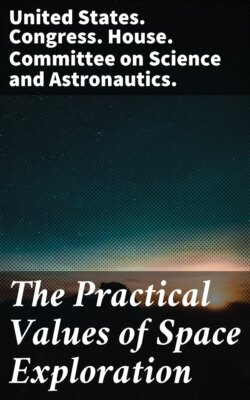Читать книгу The Practical Values of Space Exploration - United States. Congress. House. Committee on Science and Astronautics. - Страница 9
На сайте Литреса книга снята с продажи.
STEERING A MIDDLE ROAD
ОглавлениеTable of Contents
In any endeavor which is as futuristic as space exploration it is not difficult to become lost in the land of the starry-eyed prognosticators. Conversely, it is also easy to find oneself lining up with the debunkers and the champions of the status quo, for their arguments and views give the impression of being hard-headed, sensible.
If one must err in either direction, however, it is probably safer, where space is concerned, to err in the direction of the enthusiasts. This is because (and subsequent parts of this report will show it) the Nation cannot afford not to be in the vanguard of the space explorers.
Events today move with facility and lightning rapidity. Today, more than ever, time is on the side of the expeditious. We can no longer take the risk of giving much support to the scoffers—to that breed of unimaginative souls who thought Robert Fulton was a fool for harnessing a paddlewheel to a boiler, who thought Henry Ford was a fool for putting an internal combustion engine on wheels, who thought Samuel Langley was a fool for designing a contraption to fly through the air.
There are always those who will say it cannot be done. Even in this era of sophisticated flight there have been those who said the sound barrier would never be broken. It was. Others said later that space vehicles would never get through the heat barrier. They have. Now, some say men will never overcome the radiation barrier in space. But we can be sure they will.
It is undoubtedly wise for the layman, in terms of the benefits he can expect from the space program in the foreseeable future, to steer a reasonable course between the two extremes. Yet one cannot help remembering that the secret of taking practical energy from the atom, a secret which the human race had been trying to learn for thousands of years, was accomplished in less than a decade from the moment when men first determined that it was possible to split an atom. It is difficult to forget that even after World War II some of our most respected scientists sold short the idea of developing long-range missiles. Impractical, they said; visionary. But 6 years after the United States went to work seriously on missiles, an operational ICBM with a 9,000-mile range was an accomplished fact.
